Discoveries for life
The faces of health research 2025
| Title |
|---|
Why does the stability of atherosclerotic plaques differ between men and women?
Jae Hyun Byun (Mr.) Cardiovascular disease (CVD) is the leading cause of death and disability worldwide. A major driver of CVD is atherosclerosis, which involves the build-up of fats in major arteries forming what is known as plaque. Over time, the plaque can become structurally unstable and rupture, reducing blood flow to vital organs and leading to heart attacks and strokes. To complicate matters, sex differences exist: men are more prone to develop unstable plaques, while women exhibit worse outcomes after a stroke. Despite these well-documented differences, there is currently a lack of sex-specific guidelines for managing atherosclerosis. Jae Hyun Byun, a CIHR Vanier Scholar at McGill University supervised by Dr. Stella Daskalopoulou, is exploring how sex hormones might influence plaque instability. Sex hormones are chemical messengers that differentiate the biological sex of an individual and have been shown to have several effects on cells present in the plaque. As such, Jae Hyun’s research aims to identify potential markers using multi-omics that relate to sex-specific plaque phenotypes to improve stroke risk prediction and management in both males and females. Further reading X (Twitter) |
From tragedy to transformation: advancing cardiac disease detection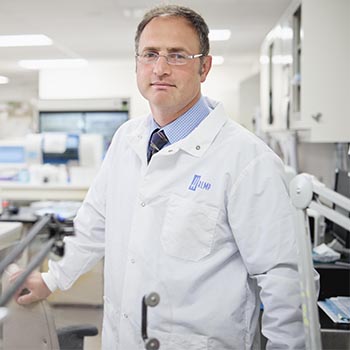
Dr. Pete Kavsak After obtaining my Clinical Chemistry Diploma (June 2004), I was eager to do research aimed at improving laboratory testing. That fall, my father-in-law went to the hospital with shortness of breath, was discharged home and tragically died later that night. Afterwards, I spoke to the doctor who cared for him in the hospital, and I remember two salient points: one, that my father-in-law did not disclose his heart condition and two, that despite the doctor interpreting the laboratory test appropriately the test itself was suboptimal and most likely missed heart injury. Over the next 20 years, and several CIHR grants, I and many, many others worked to further optimize laboratory tests used to detect heart injury: first by demonstrating the importance of low levels of cardiac troponin and then by working with industry to develop better tests, such as high-sensitivity cardiac troponin, which is now the gold standard for heart injury and heart attacks. Further reading |
How a daily fish oil supplement could help millions of Canadians prevent diabetes and heart disease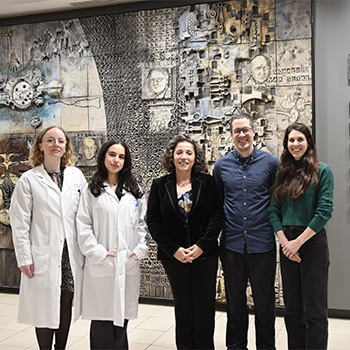
Dr. May Faraj In clinical and research practice, we measure blood particles that carry “bad cholesterol,” or low-density lipoprotein (LDL), to evaluate our risk for heart disease. Most people with type 2 diabetes (T2D) die because of heart disease induced by high numbers of blood LDL particles, measured as apoB. What we established over the past 16 years is that high blood apoB is a cause and not only a consequence of T2D in humans. Through two CIHR-funded clinical trials, we showed that LDL particles provoke the dysfunction of human fat tissue, which fuels multiple anomalies in sugar and fat metabolism leading to T2D. Luckily, we also showed that the intake of fish oil supplements can treat LDL-induced anomalies. About 50% of middle-aged Canadians have high blood apoB. Thus, targeting this large proportion of Canadians with readily available fish oil may markedly reduce their risk for heart disease and T2D, easing the financial burden on our health care system. Further reading
|
Infant Crying eLearning: Supporting new families in Canada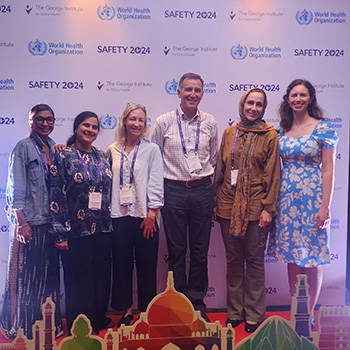
Ms. Karen Sadler A baby's persistent crying is the leading trigger for shaking an infant, a harmful response to frustration and anger which can cause serious brain injury. To ensure prevention messaging is reflective of Canada's diverse population, focus groups were conducted with parents and caregivers of young children (4 years old and under) who identified as newcomers or immigrants, or from under-resourced communities. Their insights, combined with best practice evidence, helped guide the content development of a new eLearning module focused on safe and effective baby soothing techniques, understanding typical infant crying, and managing caregiver stress, in order to prevent baby shaking and other forms of physical abuse. Perinatal Services BC will launch this module in late 2025. This project provides access to reliable health information for new parents and caregivers. It normalizes feelings of frustration and strengthens confidence in preparing for, and responding to, inconsolable crying in order to reduce the risk of harmful actions. The eLearning module on infant crying won Best Poster Presentation Award—Violence Prevention and Trauma Care at the 15th World Conference on Injury Prevention and Safety Promotion in New Delhi, India in Fall 2024. Further reading |
Making pre-clinical trials for brain disease therapies more predictive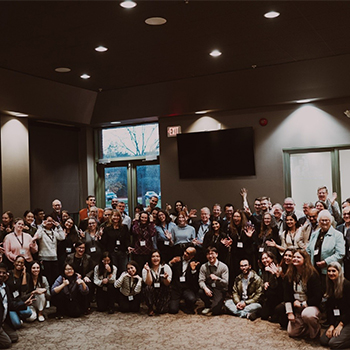
Dr. Ravi S. Menon Every year, scientists discover drugs that seem to cure brain diseases like Alzheimer’s in animals, but over 90% of these cures don’t work for people. That’s often because studies don’t reflect how diseases work in humans. They may use the wrong success measures, study only male animals, skip brain imaging, or seldom replicate results. The Translational Initiative to De-risk NeuroTherapeutics (TRIDENT) is a research platform designed to enhance the predictive value of pre-clinical drug testing for human outcomes. By including both sexes, validating across research sites, sharing results publicly, and using human-derived cell models, specialized animal models, and tools like memory tests and brain scans, TRIDENT is testing drugs at the pre-clinical stage using standards like those used in human trials. Backed by CIHR, NSERC, and SSHRC through the New Frontiers in Research Fund and partnering with national neuroscience leaders, this initiative is reshaping pre-clinical testing so only the most promising drug candidates advance to clinical trials. Through multi-site collaboration and validation between research labs at Western University, CAMH, McGill University, the Neuro, the Douglas Research Centre, and the University of Toronto, TRIDENT is paving the way for effective brain disease therapies to reach people worldwide faster than ever. Further reading Bluesky Youtube |
How COVID-19 policies affected injuries in children and youth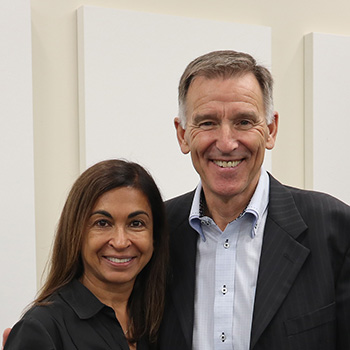
Dr. Ian Pike Dr. Shelina Babul During the COVID-19 pandemic, stay-at-home policies changed how and where children and youth were injured—but not how often. Using hospital data from Ontario and British Columbia, we found that while the overall number of unintentional injuries stayed about the same, how and where kids were getting hurt changed due to the circumstances. With fewer cars on the road during lockdown, traffic-related injuries dropped. But as kids spent more time at home, injuries from falls and unintentional poisoning increased. We now better understand the effects of lockdown policies on unintentional injuries at a population level. This study highlights the importance of having adequate and timely surveillance to tailor safety messages. When it comes to violence-related injuries, such as child abuse and neglect, the picture was more complex, as an umbrella review found increases in some studies, while others showed decreases. Based on emergency department and hospitalization data in Ontario, we found a sharp decrease when the initial lockdown policies were put in place, before returning to pre-pandemic levels. We believe the decrease was mainly due to families avoiding hospitals. In BC, hospitalization data showed no changes during the initial lockdown nor in the two-year follow-up period. Altogether, we believe COVID-19 lockdown policies did not significantly increase the rate of violence-related injuries, but it's important to improve data collection and surveillance, especially during public health emergencies, when traditional sources are affected or unavailable. |
Transforming Health Care from Within: Dr. Rabia Khan's Research on Intersectionality, Burnout, and Health Equity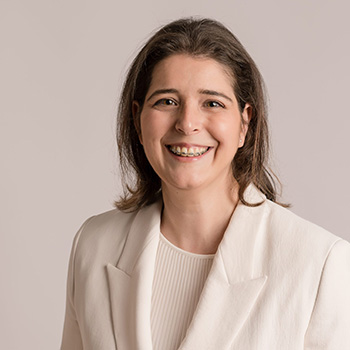
Burnout among health care workers, particularly those from marginalized groups, has become a critical issue—one that Dr. Rabia Khan is determined to address through her research. Dr. Rabia Khan, a critical social scientist, is among the first cohort of researchers funded through the CIHR Research Excellence, Diversity and Independence (REDI) Early Career Transition Award. This award helps researchers from underrepresented groups grow their careers by offering mentorship and support. Thanks to this award, Dr. Khan has moved into an independent research faculty position. Dr. Khan's REDI mentors are Dr. Laura Nimmon, Dr. Rola Ajjawi, Dr. Kevin Eva, and Dr. Saleem Razack. Dr. Khan's project "Addressing burnout in women physicians with intersectional identities: a narrative inquiry and life story approach" seeks to understand and address the alarming rise of burnout, which has escalated in the wake of the COVID-19 pandemic. Burnout severely affects health care workers, especially women and marginalized groups including racial minorities, LGBTQ12S+ individuals, and people living with disabilities. Dr. Khan's study follows the life stories of women physicians who are still in training or early in their careers. She explores the systemic barriers they face, such as gender bias, discrimination, limited career advancement, and the added complexities of their intersectional identities. Calling for physicians and trainees to fight systemic injustices, Dr. Khan's research challenges traditional views of well-being in the health care system. Her research focuses on uncovering the root causes of burnout and the barriers to career success in medicine. She advocates for more inclusive, safe, and supportive workplaces for all health professionals. By directly informing training curricula, health policies, and practices, Dr. Khan aims to build a more equitable and sustainable health care system—one where all health care workers, regardless of their background, can thrive. Further reading |
Unlearning and undoing racism in public health through a powerful partnership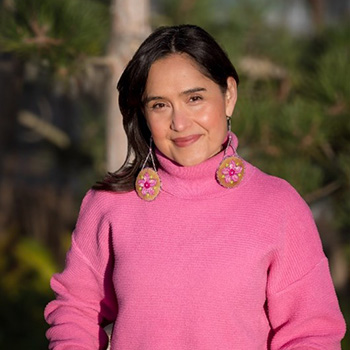

In British Columbia (BC), two public health leaders—Dr. Danièle Behn Smith, an Eh Cho Dene and Métis physician, and Dr. Kate Jongbloed, a white settler epidemiologist—are working together to address anti-Indigenous racism in the health system. Their project, Unlearning & Undoing Systemic White Supremacy and Indigenous-specific racism, helps staff at the Office of the Provincial Health Officer (OPHO) recognize and change harmful practices rooted in colonialism and white supremacy. The project uses research and practical tools to support staff in learning, reflecting, and taking action. It's already making a difference: more Indigenous professionals are being hired, and there's a stronger commitment to Indigenous rights and reconciliation in BC'S public health system. Dr. Behn Smith says the project has sparked real change in how OPHO works, pushing the team to confront uncomfortable truths and demonstrate trustworthiness. Dr. Jongbloed adds that settler health systems must follow the guidance of Indigenous Peoples to truly support health and wellness. In 2024, they launched the Unlearning & Undoing Lab to continue this work, funded by Michael Smith Health Research BC. Their work is a powerful example of how accountability, humility, and Indigenous leadership can reshape public health for the better. Further reading |
Should I use my medication during pregnancy? Should I prescribe this medication to my pregnant patient?
Dr. Anick Bérard My research focuses on the safety of medication use during pregnancy for mothers and children. Although more than 75% of pregnant people use medications to treat acute or chronic conditions during pregnancy, they are systematically excluded from randomized clinical trials before any medications are put on the market. This means that physicians are often prescribing without an evidence-based framework during pregnancy, which potentially puts hundreds of thousands of pregnant people at risk every year in Canada. I lead a CIHR- and SPOR-funded Canadian initiative on the safety of medication use in pregnancy (CAMCCO), which comprises a research arm (data on over 10 million pregnancies with up to 30 years of follow-up), training arm (more than 78 hours of virtual training on feto-toxicity every year), and a knowledge dissemination hub for the population at large but also the prescribers. CAMCCO includes more than 80 researchers and knowledge users across Canada, a community of close to 2,000 patient-partners, and is supported by 19 Canadian universities. CAMCCO is unique and innovative, and partners with the Society of Obstetricians and Gynaecologists of Canada. Over the years, my research activities have had direct impact on influencing policies and improving clinical practice and patient care in the field of antidepressants and the treatment of mental disorders during pregnancy; antibiotics/antiretrovirals; migraine drugs; anti-rheumatic drugs; acne drugs; anti-nausea drugs; medically assisted technologies; and recently GLP-1 agonists (i.e., Ozempic) used to treat chronic diabetes in pregnancy. CAMCCO has trained more than 150 graduate students and early career researchers, helping build a strong future of support for women’s health. Further reading
X (Twitter) |
Community Voices, Informed Choices: A Video Initiative Promoting Immunization in Central Alberta’s Indigenous Populations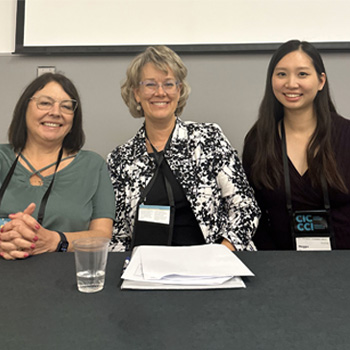
Left to right: Bonny Graham, Shannon MacDonald, Maggie Lin Dr. Shannon MacDonald Bonny Graham Maggie Lin Vaccination rates among Indigenous children across Canada often lag the national average, particularly in rural and remote communities. Not having easy access to health care services may contribute to this disparity; however, historical instances of medical testing on Indigenous Peoples without their consent may also be contributing to vaccine hesitancy. We developed a video to help build vaccine confidence among First Nations populations in Central Alberta. It was co-created through a collaboration between the Applied Immunization (AIMM) Research Team at the University of Alberta and Maskwacis Health Services, which serves a large community of four Cree Nations in central Alberta. The video provides information, motivation, and encouragement to expectant First Nations parents to support decision-making about childhood immunizations. It features language, storytelling, and imagery drawn directly from the community, framing vaccinations within a First Nations context. We believe the video, which won third place in the video category of the 2024 IHDCYH Talks competition, is a valuable tool for promoting First Nations children's health by empowering families to make informed decisions about their child's immunization. Further reading X (Twitter) |
Opening up mental health research: Open science at the Douglas Research Centre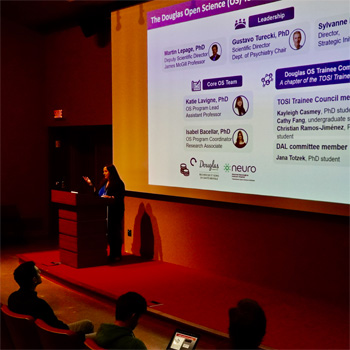
Dr. Katie Lavigne In 2021, the Douglas Research Centre became the first Canadian mental health research institution to adopt open science on an institutional scale. Open science can enhance collaboration and accelerate discoveries for mental health. Just think of COVID-19 research, when fast-paced, open, global efforts delivered a vaccine against the clock. Our open science program changes the way mental health research is done, with ethically responsible approaches. Importantly, we bridge multiple independently funded research projects at our institute, and several of our researchers and projects organically adopt open science practices. For us, open science goes beyond increasing openness within the scientific community; we must engage and partner with service users and research participants. As such, we focus not only on innovations such open measures or datasets but also prioritize patient partnerships and co-designing projects with people with lived experience. We hope that our efforts will improve understanding and treatment of mental health disorders. Further reading |
Insights gained on Canadian pedestrian and cycling injuries since the COVID-19 pandemic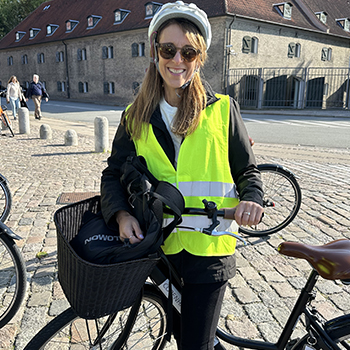
Dr. Linda Rothman As a CIHR-funded researcher at Toronto Metropolitan University, I am leading a pan-Canadian team examining trends in pedestrian and cycling injuries since the COVID-19 pandemic. We are evaluating the effectiveness of new bicycling infrastructure and automated speed enforcement, while also addressing key data gaps related to road injuries, infrastructure implementation, and pedestrian and cycling activity. Our research has already uncovered disparities in injury rates among marginalized groups, as well as inequities in the placement of road safety infrastructure. To drive meaningful change, we’ve built strong partnerships with municipalities, provincial and federal governments, not-for-profit organizations, and academic institutions across Canada. This research is informing the planning and implementation of evidence-based road infrastructure to make walking and cycling safer for everyone. Further reading X (Twitter) |
This small surgical step cuts stroke risk in a big way
Dr. Richard Whitlock Stroke is a leading cause of long-term disability and death worldwide. For people with atrial fibrillation, a common heart rhythm disorder that makes stroke five times more likely, reducing that risk is critical. While blood thinners are often prescribed, their use is limited by bleeding risks and other complications, which can lead to temporary or even permanent discontinuation. That’s why we set out to explore another option, something that doesn’t have those types of limitations. Through our CIHR-funded LAAOS III study, led by the Population Health Research Institute, we tested whether surgically closing off a small area of the heart, called the left atrial appendage (LAA), during open-heart surgery could reduce strokes. We enrolled 4,811 patients from 27 countries, all of whom were already scheduled for heart surgery. We randomly assigned some to receive the LAA closure, a simple four-to-six-minute addition to their surgery, while others did not receive the procedure. After four years of follow-up, we found that patients who had their LAA closed saw the risk of stroke drop by one-third. This fast, low-risk procedure is an easy step during surgery that can lead to longer, healthier lives for people at high risk of stroke. Today, every major expert body worldwide that advises on the treatment of atrial fibrillation gives this procedure its strongest recommendation. Further reading
X (Twitter) |
CP@clinic: My doctor thinks it’s super!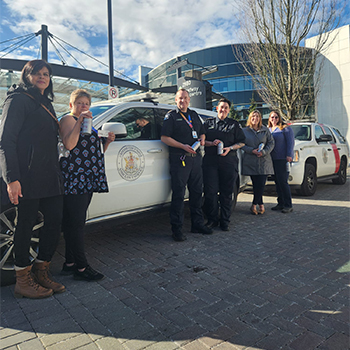
Dr. Gina Agarwal I am a primary care epidemiologist and have focused my career on improving health care systems for vulnerable populations, especially older adults. CIHR funding enabled me to develop the Community Paramedicine at Clinic (CP@clinic), an innovative program that has improved the health and quality of life for low-income older adults. CP@clinic trained paramedics to meet with older adults in social housing buildings to conduct evidence-based assessments, provide tailored health education, and reconnect them to vital primary care. CP@clinic addresses the unmet health needs of vulnerable and underserved older adults. It has significantly improved older adults’ quality of life, lowered their chronic disease risk, reduced avoidable 911 calls, improved social connectedness, lowered long-term care transfers, shortened hospital stays, and generated health care savings. CP@clinic has been scaled to British Columbia, Quebec, and 78% of Ontario Paramedic Services, reaching over 16,000 low-income older adults and potentially impacting over 305,000 low-income social housing residents. Further reading X (Twitter) |
Just the facts on intranasal fentanylA 2-page handout designed, with patients, for patients receiving intranasal fentanyl for pain management during hospitalization 
Dr. Samina Ali and the Solutions for Kids in Pain Western hub team Intranasal fentanyl is a very effective medication for providing quick pain relief to children with severe pain and is commonly used in emergency departments. However, many families are unfamiliar with medical fentanyl and worry about its use, given what they have heard about illicit ('street') fentanyl. The Solutions for Kids in Pain (SKIP) team created a handout to answer the most common questions identified by families to help them feel comfortable with its use. This resource was created as part of a Health Canada funded project led by the SKIP team, Youth in Pain: Solutions for effective opioid use. This project shares evidence-based solutions for the medical use of opioids to address immediate and long-term pain in youth. Opioid medications are not necessary in all cases but should be considered as part of multimodal pediatric pain management to support better health outcomes and prevent future higher-risk substance use. Even when indicated and appropriate, opioids may be withheld from youth due to stigma and fears about higher-risk use or opioid use disorder. This intranasal fentanyl resource is one of more than 30 tools and resources created to help address this problem through the ‘Youth in Pain’ project, which are all freely available on SKIP’s website. This entry won a special commendation in the infographic category of the 2024 IHDCYH Talks competition. Further reading X (Twitter) |
Is Medical Cannabis Safe for Children?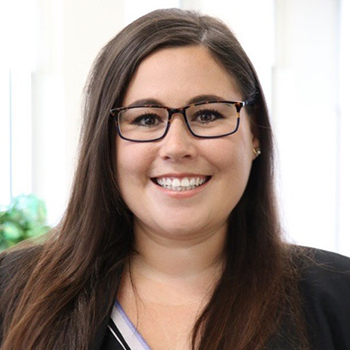
Dr. Lauren Kelly Medical cannabis is being used more often to treat children with conditions like epilepsy and chemotherapy-related nausea. However, there isn’t enough clear information about its safety. Parents and physicians need to know the risks, but research on side effects in children is limited. Our study brings together data from multiple clinical trials to better understand the effects of medical cannabis in children and teens. We analyzed how often side effects occurred, how serious they were, and how they compared to other treatments. This project is important because it highlights potential risks, such as increased chances of side effects like drowsiness, diarrhea, and liver enzyme changes. By providing a clearer picture of the risks, our study helps physicians and families make more informed decisions. It also shows the need for better long-term research to ensure safe use. This entry won a special commendation in the infographic category of the 2024 IHDCYH Talks competition. Further reading X (Twitter) |
Beyond Bandaids: Collective Action to Right-Size Children’s Healthcare SystemsChild health and health system research: Informing the transformation of children’s healthcare systems 
Emily Gruenwoldt Children’s Healthcare Canada is on a mission to “right-size” children’s healthcare systems. From coast to coast to coast, and across the continuum of care, children, youth, and their families are experiencing long and costly delays for essential and time-sensitive healthcare services. We'll explore what this means in real-world contexts along with the collective action required to change the way the systems work and interact and intersect. The 2024-25 and 2025-26 SPARK Conversations podcast series are dedicated to the theme of right-sizing. Right-sized healthcare systems for children are accessible, equitable, connected healthcare systems designed for the needs of children, youth, and their families. They are grounded in evidence (from research, practice, lived/living experience, health system leadership, and policy). In this podcast episode, host Dr. Katharine Smart and guest Dr. Christine Chambers, Scientific Director of CIHR-IHDCYH, explore the role and value of child health and health system research in right-sizing healthcare systems serving children, youth, and their families. They offer insights into demystifying research and explore questions like How can we work together to increase awareness and understanding of the role and value of child health and health systems research? And What is the value of research to children, youth, their families, and Canadians more generally? This entry won third place in the 2024 IHDCYH Talks competition in the podcast category. Further reading
X (Twitter) |
Periods: Menstrual health education makes a difference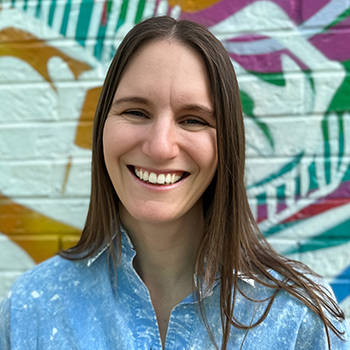
Ms. Kate Wahl Getting a period is a normal and natural process. However, taboos, stigma and shame prevent many people from understanding periods or recognizing symptoms that may signal a health concern. With a team of community members, researchers, and clinicians from the University of British Columbia, Ms. Wahl tested a brief menstrual health education program in middle and secondary schools. The study showed that students of all genders – not just people who get periods – learned key facts about periods, felt more comfortable talking about periods, and recognized the importance of menstrual health. Endometriosis Network Canada used the study results to develop What you need to know. Period., a program designed to end menstrual taboos, stigma, and shame by promoting open conversations about periods. The free, bilingual program gives young people a solid foundation of menstrual health knowledge and raises awareness of period-related health conditions. A video about this project won a special commendation in the 2024 IHDCYH Talks video competition. Further reading
X (Twitter) |
Imagining a future without dialysis and transplants: revolutionizing kidney disease treatmentA better understanding of autoimmune kidney disease could help develop targeted treatments and prevent kidney failure 
Dr. Alexandra Cambier In Canada, 1 in 10 people, or 4 million, suffer from kidney disease. In 2023, only 74 children received a kidney transplant, with an average wait time of 1,195 days for a deceased donor and 373 days for a living donor. Yet, every year, only 19 people per million become organ donors. We aspire to a future where dialysis and kidney transplantation are no longer necessary and are relegated to history like old treatments on display in a museum. To make this happen, my laboratory is committed to gaining a better understanding of autoimmune kidney diseases, in particular childhood IgA nephropathy and nephrotic syndrome. We analyze the activation of the complement system and inflammatory pathways, in particular the cytokines TNF, APRIL and BAFF, which play a key role in the progression of these diseases. Thanks to this approach, we are refining our understanding of the diseases’ pathophysiology, highlighting specific biomarkers and identifying precise therapeutic targets to halt their progression before they lead to dialysis or transplantation. A video about this project won a special commendation in the 2024 IHDCYH Talks video competition. Further reading X (Twitter) |
Think Twice Podcast: Knowledge Translation Through PodcastingA grad student podcast brings more nuance to mainstream media coverage of neuroscience 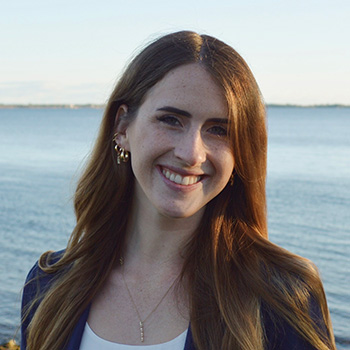
Dr. Elena Koning, PhD graduate, Centre for Neuroscience Studies, Queen's University 
Ms. Eve Racette, PhD candidate, Centre for Neuroscience Studies, Queen's University Knowledge translation is essential to promote evidence-based decision making, media literacy, and public trust in science. However, despite vast societal importance, it is not a part of standard graduate training in most institutions. To help solve this problem, the Think Twice podcast was created by Dr. Elena Koning at the Centre for Neuroscience Studies at Queen's University and is currently being co-led by Dr. Koning and PhD candidate Eve Racette. With over 40 episodes published on a range of popular neuroscience topics, Think Twice provides a platform for early-career neuroscientists to practice knowledge translation, counteract misinformation, and foster community engagement in science. This podcast initiative continues to fill a critical gap to support increased capacity in graduate-level knowledge translation. This entry won second place in the 2024 IHDCYH Talks competition in the podcast category. Further reading X (Twitter) |
Healthy Beginnings, Vibrant ChildhoodsSupporting Educators to Promote Children's Movement Behaviour 
Ms. Sheri Kim, Research Assistant, Child Health & Physical Activity Laboratory, School of Occupational Therapy, Western University 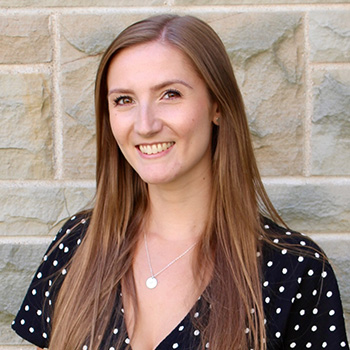
Dr. Sophie Phillips, Post-Doctoral Associate, Child Health & Physical Activity Laboratory, School of Occupational Therapy, Western University 
Dr. Trish Tucker, Lab Director; Professor and Associate Director, Child Health & Physical Activity Laboratory, School of Occupational Therapy, Western University Early Childhood Educators (ECEs) are pivotal in shaping healthy habits for young children. In Canada, two-thirds of young children spend most of their weekdays in childcare, making ECEs key influencers during these formative years. However, ECEs feel underprepared to provide high-quality movement opportunities. In response, researchers from the Child Health & Physical Activity lab at Western University collaborated with diverse experts to develop an evidence-based e-learning course on physical activity and sedentary behavior titled 'TEACH'. The TEACH course advances ECEs' knowledge, confidence, and motivation to integrate healthy movement practices into daily programming, ensuring children receive strong foundations for lifelong health and wellbeing. We aim to share insights from ECE instructors about the TEACH course, underscoring its value and potential for broader implementation into post-secondary education. Aligned with CIHR-IHDCYH's vision for better beginnings and vibrant futures, the TEACH course addresses children's movement behaviour needs by strengthening the support systems that matter most. This video won second place in the 2024 IHDCYH Talks video competition. Visit the Child Health and Physical Activity Laboratory YouTube channel to watch the video. Further reading
X (Twitter) |
Building Bridges Between Families and ScientistsA podcast as a space for dialogue on cerebral palsy  Ms. Sandrine Gagné-Trudel Every year in Canada, some 2,000 families learn that their child has cerebral palsy, a complex condition that impacts their daily lives and can create many challenges. In response, scientists are striving to better understand these realities and develop appropriate solutions. However, scientists can be unaware of families' priorities and everyday realities, and do not always succeed in making their research findings accessible. The "Espace adapté" [Adapted Space] podcast was born out of a desire to encourage dialogue between scientists and families. The podcast bridges research and family experience. Parents of children with cerebral palsy share their experiential knowledge and talk about their varied realities: parental stress, coping journeys, navigating healthcare, and much more. For their part, the scientists passionately explain their discoveries in these same areas. The sharing platform allows the parties to learn from each other, paving the way for greater collaboration and significant advances in the field of cerebral palsy through enhanced mutual understanding. This entry won first place in the podcast category of the 2024 IHDCYH Talks competition. Further reading
|
How churros inspired a new approach to heart surgeryA moment at a churro food truck sparked an innovative idea that promises to improve bypass surgery 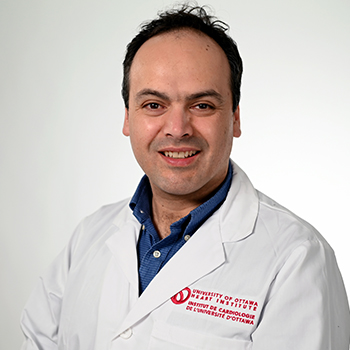
Dr. Marcelo Muñoz, Associate Scientist, University of Ottawa Heart Institute 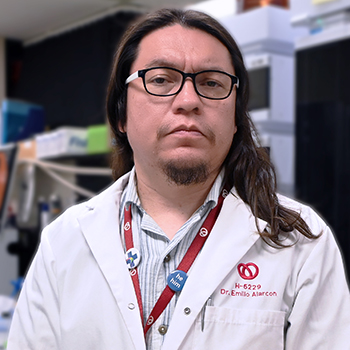
Dr. Emilio Alarcón, Senior Scientist, University of Ottawa Heart Institute Marcelo Muñoz, a pharmacist and chemist in the Bio-Engineering and Therapeutic Solutions (BEaTS) lab at the University of Ottawa Heart Institute noticed how churro dough wrapped neatly around a rod and hardened. This led to the idea of creating synthetic blood vessels in real time. Dr. Muñoz’s team worked with BEaTS director, Emilio Alarcón, to build a small device that works like a churro machine. Instead of dough, the device produces tubular grafts made from biopolymers—naturally derived or engineered materials—and hardens them using blue light. This innovation could address a critical need in coronary artery bypass grafting, a type of heart surgery. Approximately 10 to 20% of patients—often older or diabetic—might not have vessels suitable for this procedure. Muñoz’s project is currently at the preclinical stage, but the team hopes to refine the technology using peptide-based biomaterials. Their goal is to “print” new blood vessels directly inside the human body through a catheter during minimally invasive surgeries. Further reading X (Twitter) |
Advancing Equity, Access and Capacity in Canada’s Primary Health Care Systems
Agnes Grudniewicz, Associate Professor, University of Ottawa 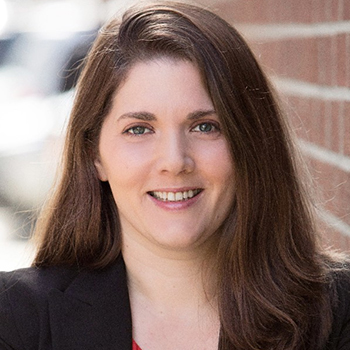
Lindsay Hedden, Assistant Professor, Simon Fraser University 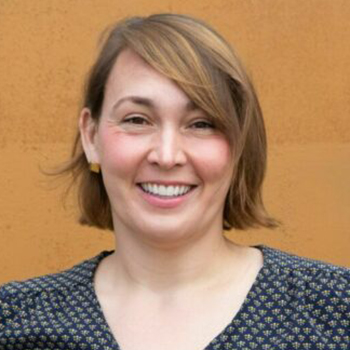
Ruth Lavergne, Associate Professor, Dalhousie University Dr. Lindsay Hedden, Dr. Agnes Grudniewicz, and Dr. Ruth Lavergne join forces to address a critical issue: Canada’s primary health care system is overwhelmed with increasing demand and workforce strain, leaving many without timely and equitable access to quality care. With support from the CIHR Institute of Health Services and Policy Research (IHSPR’s) Catalyst Grants and CIHR’s Project Grants, Dr. Hedden, Dr. Grudniewicz, and Dr. Lavergne in collaboration with a large team of researchers and system leaders across Canada, offer a comprehensive, data-driven exploration of Canada’s primary care system, focusing on equity, workforce capacity, practice management, payment reform, virtual care and the rise of privatization. Dr. Hedden, Dr. Grudniewicz, and Dr. Lavergne’s research leverages cross-Canadian collaboration through their national Health Systems Research Lab and engages with varied groups including family physicians, nurse practitioners, health care policy makers and patients, across multiple provinces and territories. A broad network of partners including provincial governments, regional health authorities and clinician associations strengthens the relevance and impact across the Canadian health care landscape. For example, cross-provincial findings emphasize that policy reforms must explicitly prioritize equity and demonstrate the urgent need for stronger oversight to prevent the negative consequences of privatization in Canada’s health care system. The research addresses social and economic disparities and tackles timely and significant issues — whether it is alignment of primary care capacity with demographic trends, changing access patterns, physician payment reforms, new models of care or the expansion of private health care — ensuring the findings are highly relevant to policy and decision makers.
To learn more about their work, see articles on Disparities in access to primary care in Canada and understanding how private financing and for-profit delivery operate within Canadian healthcare and the Health System Research lab webpage, a research lab they share with colleagues across provinces. Their work is also supported by Michael Smith Health Research British Columbia and Research Nova Scotia, and Dr. Lavergne holds a Tier II Canada Research Chair in Primary Care. |
Helping Babies Breathe: Pulmonary Surfactant for Premature Infants with Respiratory Distress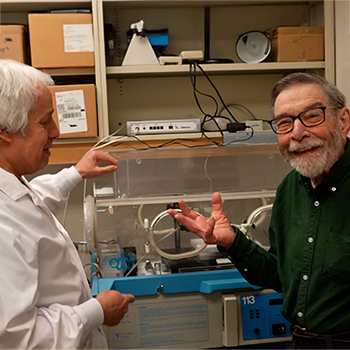
Dr. Fred Possmayer (right) with a former trainee, Dr. Ruud Veldhuizen (left), Associate Professor, Physiology and Pharmacology, UWO. Dr. Possmayer’s research on pulmonary surfactant was continuously funded by MRC/CIHR from 1972 to 2006. As a result of his laboratory’s development of BLES, Dr. Possmayer was awarded the Order of Ontario in 2023. Fred Possmayer, PhD When I began my MRC/CIHR-supported research on pulmonary surfactant in 1972, the major cause of newborn mortality was premature babies dying of the Respiratory Distress Syndrome (RDS). This condition made breathing difficult because their lungs didn’t have sufficient surfactant—a substance that helps keep the lung’s terminal air sacs, the alveoli, open. In collaborations with Dr. Goran Enhorning, University of Toronto, a clinical formulation, Bovine Lipid Extract Surfactant (BLES), was developed for treatment. BLES administration buys premature infants sufficient time to produce their own surfactant. Today, BLES is used across Canada and in more than 20 other countries. Further investigations in my laboratory led to other insights into surfactant function. For example, we discovered two small hydrophobic proteins, SP-B and SP-C, present in natural surfactant, that are essential for surfactant function. Studying these two proteins helped us discover a number of mechanisms related to surfactant action, both in the laboratory and in the body. Thanks to treatment with clinical surfactants, such as BLES, and other improvements in paediatric care, the number of babies dying from RDS in Canada and the USA has fallen dramatically, from over 10,000 deaths per year to less than 200. Further reading
|
Optimizing Independence, Mobility, and an Active Life for Older Adults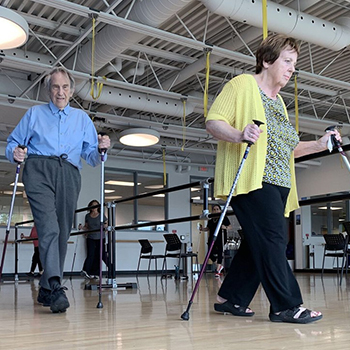
Dr. Alexandra Papaioannou Our CIHR-funded OPTIMAL Fitness study has helped older Canadians to regain strength, confidence, and independence. We have developed a program that combines supervised exercise, nutrition, and medication review to help individuals enhance their balance and energy levels. Our community-based program, developed at the Geras Centre for Aging Research, Hamilton Health Sciences and McMaster University, addresses frailty and sarcopenia in adults aged 65 and older. We randomly assigned participants to one of three groups over four months: a control group that received only vitamin D, a second group that participated in tailored exercise classes and home workouts, and a third group that received exercise, protein supplements, and a pharmacist-led medication review. With over 300 individuals engaged through YMCA sites, our research shows that frailty can be improved and that aging at home is both achievable and sustainable. One participant from group three shared that they felt “more light, more energetic,” while another remarked that they were “much more willing to test myself to go to my limits — generally more hopeful.” These outcomes highlight the power of tailored interventions for older adults to restore energy, resilience, and well-being. Further reading X (Twitter) |
A new medication to treat "black fever" parasitic disease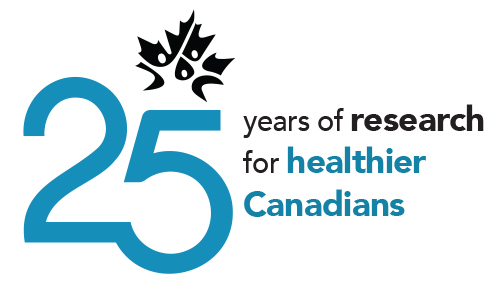 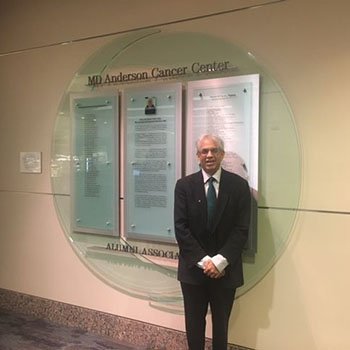 Dr. Kishor M. Wasan Fungal and parasitic infections affect millions of people around the world. One example is visceral leishmaniasis, a parasitic disease caused by insect bites that is almost always fatal if untreated. Also called kala-azar, which means "black fever", the disease sometimes causes the skin to darken alongside other symptoms including fever and enlargement of the spleen and liver. Though treatments do exist, tens of thousands of people die annually due to visceral leishmaniasis, primarily in Brazil, East Africa, and India, due to the high cost of treatments and limited availability. Injection is the only mode of treatment currently available, and it comes with serious side effects. Since 2007, with CIHR funding, our team at the Neglected Global Diseases Initiative at the University of British Columbia has been working on a groundbreaking solution: an oral medication with no serious side effects, invented by Drs. Kishor and Ellen Wasan. It's safe, cost-effective, stable in tropical climates, and has successfully undergone Phase 1 clinical trials. Now, we’re partnering with industry to get this medication into the hands of those who need it. Further reading |
Powering and muscling a healthier Canada, one bone and one muscle at a time  Dr. Jérôme Frenette With CIHR support, our team was the first to uncover a novel role for RANK/RANKL/OPG pathway, a key regulator of bone metabolism, in skeletal muscle dysfunction and cardiac hypertrophy. We showed that a 10-day treatment with osteoprotegerin (OPG) nearly reversed muscular dystrophy in fast-twitch muscles, while a two-month regimen anti-RANKL prevented cardiac hypertrophy in aging dystrophic mice. This groundbreaking discovery revealed a critical bone-muscle connection biology, sparking a wave of international research. Notably, S. Ferrari (Switzerland, 2019) reported that denosumab (anti-RANKL antibody) improved grip strength in post-menopausal and osteoporotic women and A. Bonetto (USA, 2021) found that RANKL blockade reduced cancer-induced cachexia and bone loss in mice. Through preclinical and translational research, our lab has identified promising therapeutic strategies to prevent bone, skeletal and cardiac muscle dysfunction. These findings hold potential to prolong physical independence and reduce frailty and fall risk in aging populations and individuals with muscle-wasting diseases. Further reading X (Twitter) |
Empowering youth: Transforming substance use health education to support youth well-being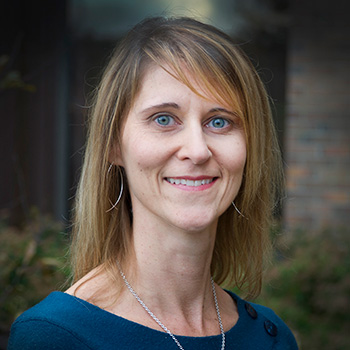 Dr. Lisa Bishop Canada is experiencing an unprecedented number of substance-related overdoses and deaths, especially among youth. Youth identified a lack of education to help inform their substance-related decisions. More effective educational, prevention, and harm reduction approaches are needed to better meet the needs of youth and protect their health and wellness. An interdisciplinary team focused on this problem is led by Drs. Lisa Bishop and Jennifer Donnan, and includes youth, people with lived and living experience, healthcare professionals, educators, and policy makers. Together, they have developed the DECYDE (Drug Education Centred on Youth Decision Empowerment) substance use prevention and harm reduction strategy that helps support youth in making informed choices about their substance use health. The strategy is rooted in equity and trauma-informed practices, and includes open access lesson plans and resources for teachers, youth, guardians, and mentors of youth. DECYDE is currently being piloted in Newfoundland and Labrador schools. Teachers highlighted the practicality and ease of use of materials and the importance of this education in promoting student wellbeing amidst rising substance use in schools. An evaluation plan has been created for full implementation of DECYDE, with plans to collect robust data to assess youth knowledge, behaviours, and attitudes. This entry won first place in the infographic category of the 2024 IHDCYH Talks competition. Further reading
X (Twitter) |
Calling all youth thinking of joining a clinical trial!Spotlight on a video resource co-created by youth for youth and their families  INFORM RARE Youth Advisory Group Opportunities for children and youth with rare diseases to participate in clinical trials are increasing as new treatments are developed and require evaluation. The Clinical Trials for Youth with Rare Diseases animated video was co-developed with youth advisors from INFORM RARE, a Canadian pediatric rare disease research network, in partnership with students from the University of Toronto. This animated video, available in English and French, is designed to simplify the complexities of clinical trials for a younger audience and their families and describe them in a rare disease context. The youth advisors (12-19 years old) chose topics and messages that were meaningful to them as youth with lived experience. The video describes distinct features of rare disease clinical trials and key questions to consider before joining a trial. It also describes the importance of autonomy and what youth can expect after joining a clinical trial. People with expertise in trial methods and ethics reviewed the final content to ensure accuracy. This video won first place in the 2024 IHDCYH Talks video competition. Further reading
Bluesky |
Expanding the use of SGLT inhibitors to improve cardiorenal diseaseDeepening our understanding of cardiorenal syndrome and reshaping the course of cardiovascular and kidney diseases  Dr. Ayodele Odutayo Currently, sodium glucose co-transporter inhibitors (SGLTi) are approved for use in specific populations, including people with both diabetes and advanced kidney disease or heart failure. However, this medication has yet to be tested in people without diabetes who are at risk for heart failure and kidney disease. To determine whether this medication can be safely expanded for use in this population considered to have cardiorenal syndrome, Dr. Odutayo's research will focus on designing and conducting a new clinical trial to examine the effect of SGLTi in this new population. These RCTs can improve our understanding of cardiorenal syndrome, including the potential to prevent co-morbidities associated with heart failure and kidney disease, and provide an opportunity to alter the natural history of cardiovascular and kidney disease. Related to this work, Dr. Odutayo has been recently awarded the 2025 Rising Star Award in Diabetes Cardiorenal and Metabolic Medicine. Further reading
X (Twitter) |
Climate Change and Adolescents: Understanding Health ChallengesExploring the Impact of Extreme Weather and Related Events on Adolescents' Lives 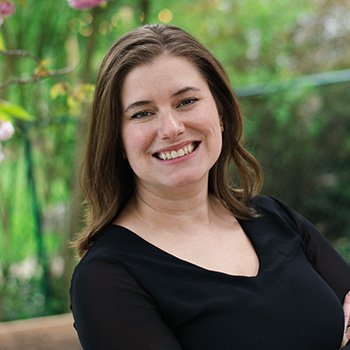 Dr. Gina Martin Dr. Gina Martin from the Faculty of Health Disciplines at Athabasca University is leading research to understand how climate change impacts adolescent health. More than previous generations, today's adolescents are increasingly facing extreme weather events, such as wildfires, extreme heat, and floods, which are becoming more frequent and severe due to climate change. Despite this, there is a significant gap in research on how these events affect adolescent health and wellbeing. Thanks to funding from the SickKids Foundation and the CIHR-Institute of Human Development, Child and Youth Health, Dr. Martin and an interdisciplinary team will explore a variety of potential health and wellbeing impacts of these events on adolescents across Canada. This study aims to help fill key knowledge gaps by providing evidence that can inform strategies for mitigating impacts. This research is novel in its focus on cumulative and repeated exposures to extreme weather events and their effects on adolescent health across the country. Also, by identifying modifiable factors, it can provide insights for developing strategies to help moderate impacts. The findings will contribute to the emerging field of climate change and health, assisting practitioners, policy makers, and advocates in safeguarding the health and wellbeing of adolescents. Further reading
X (Twitter) |
- Date modified:
